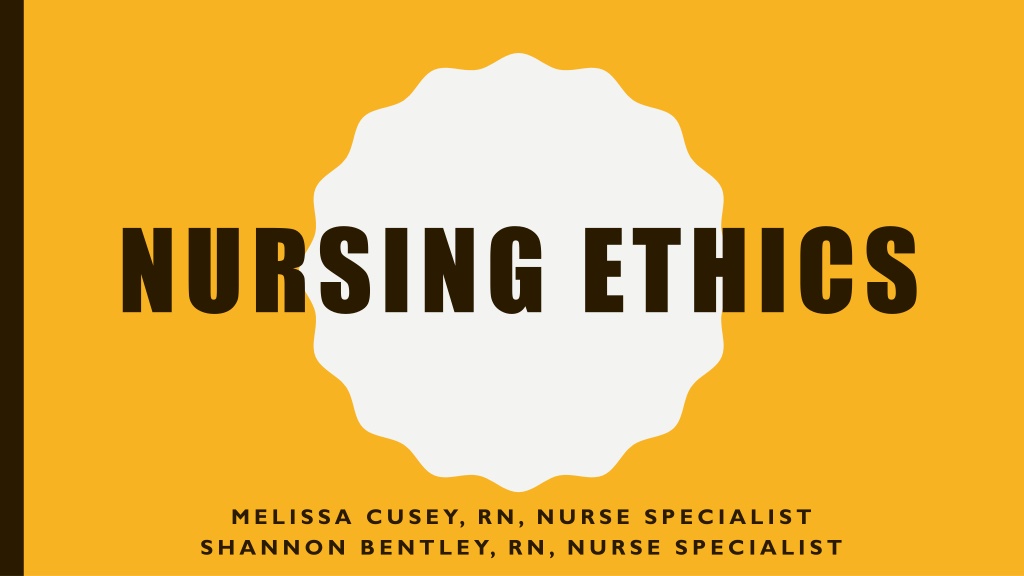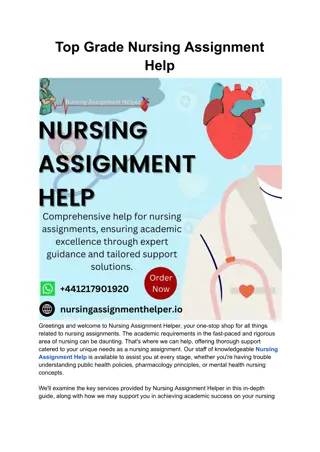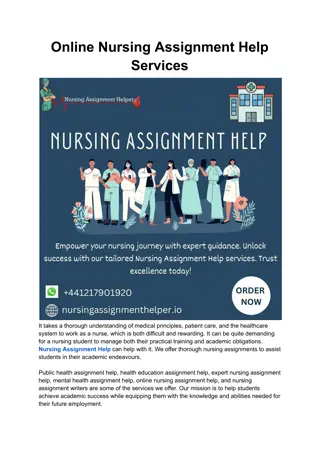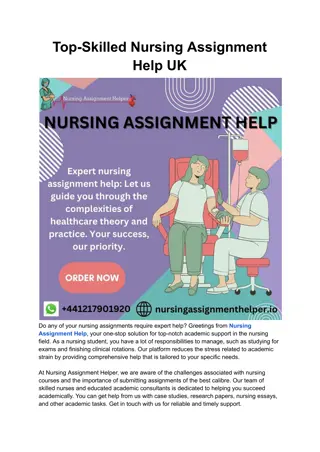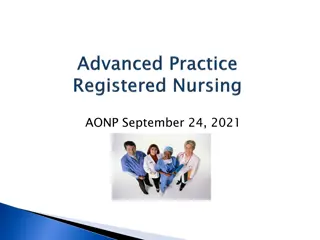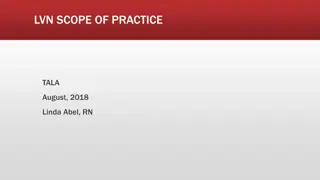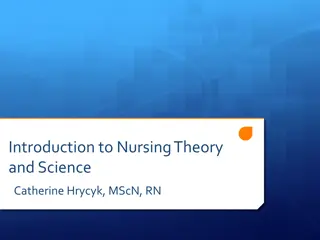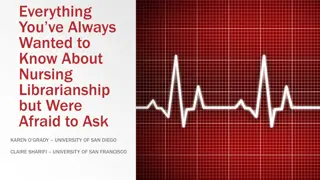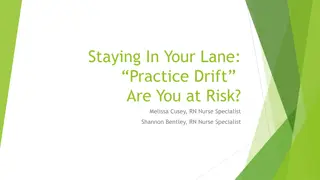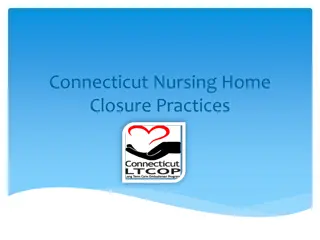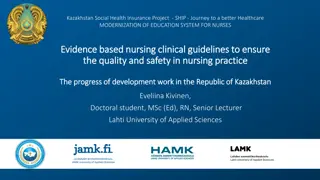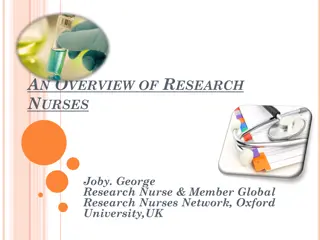Nursing Ethics and Practice Guidelines Overview
Explore the fundamentals of ethical decision-making in nursing, delve into ethical dilemmas, review the principles of nursing ethics, and understand the importance of State Practice Acts. Learn how the National Council of State Boards of Nursing provides a framework for safe and professional nursing practice based on the Model Nursing Practice Act.
Download Presentation

Please find below an Image/Link to download the presentation.
The content on the website is provided AS IS for your information and personal use only. It may not be sold, licensed, or shared on other websites without obtaining consent from the author.If you encounter any issues during the download, it is possible that the publisher has removed the file from their server.
You are allowed to download the files provided on this website for personal or commercial use, subject to the condition that they are used lawfully. All files are the property of their respective owners.
The content on the website is provided AS IS for your information and personal use only. It may not be sold, licensed, or shared on other websites without obtaining consent from the author.
E N D
Presentation Transcript
NURSING ETHICS MELISSA CUSEY, RN, NURSE SPECIALIST SHANNON BENTLEY, RN, NURSE SPECIALIST
OBJECTIVES After this presentation, participants will be able to: Define ethical dilemma List two of the five fundamental components in ethical decision making Name three of the seven Ethical Principles for Nurses
NURSING ETHICAL QUESTIONS What comes to mind when you hear Nursing Ethics? Do you even consider ethics when making decisions? Do ethics only effect major decisions such as end of life or research trials? How can ethical decisions effect your job performance?
OVERVIEW Let s think about the answers to the previous questions We will briefly go over State Practice Acts and their importance in making decisions On the following slides we will: Explore the definitions of ethics Review ethical dilemmas Review the 7 principles of Nursing Ethics Go over some scenarios
Model Nurse Practice Act And Administrative Rules And State Nurse Practice Acts
NATIONAL COUNCIL STATE BOARD OF NURSING (NCSBN) The NCSBN Model Nursing Practice Act (MNPA) and Model Nursing Administrative Rules is the frame work for all state practice acts. Each state board of nursing (BON) uses this model to provide notice, expectations regarding practice. Violations in the practice act may result in unsafe or unprofessional practice. BONs provide a broad framework for nursing practice and provide notice to nurses as to BON expectations regarding practice. Violations of such standards may result in unsafe or unprofessional practice. NCSBN Model Nursing Practice Act and Model Nursing Administrative Rules https://www.apna.org/files/public/Model_Nursing_Practice_Act_December09_final%5B1%5D.pdf
ARTICLE II SCOPE OF NURSING PRACTICE Article II. Scope of Nursing Practice3 2.2.1 Standards Related to Registered Nurse (RN) Professional Accountability The RN: Practices within the legal boundaries for nursing through the scope of practice authorized in the Nurse Practice Act (NPA) and rules governing nursing. Bases professional decisions on nursing knowledge and skills, the needs of clients and the expectations delineated in professional standards. Accepts responsibility for judgments, individual nursing actions, competence, decisions and behavior in the course of nursing practice. NCSBN Model Nursing Practice Act and Model Nursing Administrative Rules https://www.apna.org/files/public/Model_Nursing_Practice_Act_December09_final%5B1%5D.pdf
STATE PRACTICE ACTS Nurse practice act is a state law enacted by an individual state s legislature that outlines scopes and standards of practice to guarantee the safe practice of nursing. Each state s board of nursing uses its respective nurse practice act (NPA) to create administrative rules and regulations that define and clarify scopes and standards of practice.
NURSING ETHICS
DEFINITION OF ETHICS Ethics are the beliefs an individual or group maintains about what constitutes correct or proper behavior 2Corey G, Corey MS, Corey C, Callanan P. Issues and Ethics in the Helping Professions. 9th ed. Stanford, CT: Cengage Learning; 2015. as cited in Nichols, M Ethical Decision Making, NetCE.com 2017
ETHICAL DECISION MAKING Preparation Create a quiet environment to discuss the problem Beware of your personal prejudices and be honest Know the medical facts Patient or student preferences Views of the family Legal, Administrative, External factors State or Federal laws or Civil Rights Practice Acts Job Corps Policy 3Nichols, M Ethical Decision Making, NetCE 2017
ETHICAL DILEMMAS An ethical dilemma is defined as a complex situation in which there is a mental conflict between choosing two different courses of action. The conflict is ethical in nature and involves having to compromise either your personal or professional ethics in favor of one course of action. Generally speaking, the following elements need to be present in order for an ethical dilemma to exist: A decision has to be made about which course of action is best There must be different courses of action to choose from in the decision Irrespective of which course of action is taken, an ethical principle is compromised. In other words, there will be no right or perfect solution2 4http://www.excite.com/education/blog/major-ethical-dilemmas-in-nursing
ETHICAL DECISION MAKING MODEL There are five fundamental components to the cognitive decision-making process as identified by ethicists Kenyon and Congress. Name the problem Sort the issues Solve the problem by gathering solutions Act on the best solution Evaluate and reflect on the solution Kenyon P. What Would You Do? An Ethical Case Workbook for Human Service Professionals. Pacific Grove, CA: Brooks/Cole Publishing Company; 1999. Congress EP. Social Work Values and Ethics: Identifying and Resolving Professional Dilemmas. Belmont, CA: Cengage Learning; 1999: 31-33.as cited in Ethical Decision Making, NetCE.com 2017
ETHICAL PRINCIPLES FOR NURSES The ethical principles that nurses must adhere to are the principles of justice, beneficence, nonmaleficence, accountability, fidelity, autonomy, and veracity. Justice is fairness. Nurses must be fair when they distribute care, for example, among the patients in the group of patients that they are taking care of. Care must be fairly, justly, and equitably distributed among a group of patients. Beneficence is doing good and the right thing for the patient. Nonmaleficence is doing no harm, as stated in the historical Hippocratic Oath. Harm can be intentional or unintentional. Accountability is accepting responsibility for one's own actions. Nurses are accountable for their nursing care and other actions. They must accept all of the professional and personal consequences that can occur as the result of their actions. https://www.registerednursing.org/nclex/ethical-practice/
ETHICAL PRINCIPLES FOR NURSES (CONTINUED) Fidelity is keeping one's promises. The nurse must be faithful and true to their professional promises and responsibilities by providing high quality, safe care in a competent manner. Autonomy and patient self-determination are upheld when the nurse accepts the client as a unique person who has the innate right to have their own opinions, perspectives, values and beliefs. Nurses encourage patients to make their own decision without any judgments or coercion from the nurse. The patient has the right to reject or accept all treatments. Veracity is being completely truthful with patients; nurses must not withhold the whole truth from clients even when it may lead to patient distress. 6https://www.registerednursing.org/nclex/ethical-practice/
SCENARIO Two of the new students who entered the program this week are on medications which requires them to come to wellness daily for morning medications. Cheryl, a gregarious, fun, up beat student takes a BP medication. Susan, an abrasive, moody student, is on two psychotropic medications and she has been told she has to come and get her medication before the start of the training day. Susan was late leaving the dorm, due to a meeting with her RA, she came to wellness to get her morning medications. She was told because the training day had already started, she would have to wait until the next open call to get her medications. The nurses did not give her a chance to explain why she was late. At the same time Cheryl came in and the nurses told her to have a seat and they would get her blood pressure and get her medications ready. Based on the above information were the students treated fairly? What should have been done differently?
SCENARIO It is Friday afternoon and new student Laurel who arrived on Wednesday is out of her Adderall 20 mg. You know Stacy was on Adderall, but it was recently discontinued and she is no longer on center. You think it will be ok just this one time to take enough medications to cover Laurel for the weekend, until you can get her Rx filled. What is the ethical dilemma? Do you consider this fraud? What would you do if you knew this was happening on you center?
SCENARIO Gretchen comes to you and tells you she has been in a compromising situation last weekend and may have been exposed to HIV. Gretchen tells you who she was with and you know the status of that student. Are you violating the other students right to privacy (HIPAA) if you tell the students status to Gretchen? Does Gretchen have a right to know the status? What is the best way to handle this situation? Do you know your state law regarding sharing HIV status? How do you balance Gretchen's right to know whether she s been exposed to HIV with the other student s right to privacy? See ePRH 6.11 R5 for Job Corps policy on handling HIV testing.
SCENARIO Sharon, a 16-year-old student, comes to you and tells you she has missed her period and she requests a urine pregnancy test. The results come back positive. Sharon is distraught with the results and becomes hysterical. She is afraid to tell her family. Sharon is not sure she wants to keep the pregnancy and wants to know her options. Due to your personal beliefs, you do not feel comfortable giving Sharon information about terminating her pregnancy. Are you ethically required to make sure she is informed on all options? Should you contact Sharon s family and inform of the pregnancy? Who should be involved in making the decision about termination?
SCENARIO Anthony, a 22-year-old new student, requests to speak with you during his orientation to wellness. He tells you he ran out of his medication and is feeling like he is losing control. Anthony did not disclose his mental health history prior to enrollment; your CMHC will not be in until next week and can t be contacted and your center physician will not order psychotropic medications without a mental health evaluation. To further complicate the situation Anthony does not have insurance and you are over your budget for the month. Who should you contact immediately? What should the center do regarding paying for the medication?
SCENARIO You work with only one other nurse at your center. He comes to you and reports that he has completed the controlled medications count for the week. You know that two people are supposed to count, but you are busy and let it go. This goes on for several weeks. You know that you should do the count with the other nurse, but he has been working with you for a long time, you trust him completely, and you are very busy with other duties. Your colleague calls in sick one day, which leaves you to do open hours. You open the controlled medication cabinet to get out medication for a student and find the count is incorrect. After open hours you go back and realize there is a large quantity of controlled medication missing. There are only two keys to the controlled medication cabinet and you know that you have not taken any of the medications. You know that if you report it, you will be in trouble since you did not follow ePRH requirements of counting and reconciling weekly. You decide to wait and talk to the other nurse in the morning when he returns. He denies taking the medication and accuses you because you were the last one in the controlled medication cabinet. What are you going to do now? What could happen to you?
SCENARIO One of the female nurses seems to have become very friendly with a new 17-year-old male student. At first you thought it was nice that your coworker has such a good relationship with the students, but now you re starting to wonder if the relationship is appropriate. The male student comes into the HWC nearly every day and only wants to talk your coworker. On numerous occasions, you ve witnessed your coworker chatting with the male student in the halls, in the parking lot, and near the dormitories. In addition, the other day you think that you saw the nurse hand him money; however, you are not certain. You don t want to get your coworker in trouble and are not completely sure if there is anything going on; however, your intuition tells you something is not right. Who would you talk to about it and why? What would you say? Are you obligated to report your fellow nurse to human resources? If you saw them hugging would it change how you would handle the situation?
SCENARIO Shawna is a Wellness Manager at another center in the same Region. Her son, Keith, is 23 and has been on your center for 3 weeks. Keith has a history of Major Depression and ADHD. His mom has supervised his medications which has been the same for 2 years now. His mother has called several times wanting to get information from you. Keith refuses to sign a release of information. Shawna says we work together and I really need to know how he is doing. She says I won t tell him anything you say. You are a mother too and understand her concern. What would you say to Shawna? Shawna calls your CD and your CD says Job Corps is one program. Just give the information to Shawna, ok? What would you do?
SCENARIO A staff member comes in complaining of headache and nausea and you give them a Tylenol and Phenergan. Keep in mind the medication and supplies are purchased with government monies for student use. Can you give medication to a staff member? Could this be viewed as practicing medicine and working outside of your scope?
SCENARIO Your corporate office asks you to go to their sister center in another state to be acting HWM for 2 weeks while the current HWM is on leave. Your nursing license is a single state license. What do you do?
SCENARIO In your state a LPN can plant a tuberculin skin test but can not read one based on practice acts but to save time she does and you sign off on the results. In this case the LPN is working outside of her license and you are aware and allowing this to occur. Who is responsible if the LPN misreads the results? Are you being accountable if you knowingly delegate the LPN nurse to work outside of their scope?
SCENARIO Brian is disruptive in class and is constantly in trouble in his dorm. You suspect he has ADHD, but he doesn t have a diagnosis, he also has a documented seizure disorder. Your Center Director is fed up with Brian s behavior and asks you to put Brian out on a MSWR. Your CMHC is not agreeable. You place Brian on MSWR for seizure disorder without consulting the center physician. Are you practicing medicine by assigning a diagnosis code without consulting the center physician? What should you do in this situation?
RESOURCES NCSBN Model Nursing Practice Act and Model Nursing Administrative Rules https://www.apna.org/files/public/Model_Nursing_Practice_Act_December09_final%5B1%5D.pd Corey G, Corey MS, Corey C, Callanan P. Issues and Ethics in the Helping Professions. 9th ed. Stanford, CT: Cengage Learning; 2015. as cited in Nichols, M Ethical Decision Making Page 11 Nichols, M Ethical Decision Making, NetCE 2017 http://www.excite.com/education/blog/major-ethical-dilemmas-in-nursing Kenyon P. What Would You Do? An Ethical Case Workbook for Human Service Professionals. Pacific Grove, CA: Brooks/Cole Publishing Company; 1999. as cited in Ethical Decision Making Congress EP. Social Work Values and Ethics: Identifying and Resolving Professional Dilemmas. Belmont, CA: Cengage Learning; 1999: 31-33.as cited in Ethical Decision Making https://www.registerednursing.org/nclex/ethical-practice/ Staying In Your Lane: Practice Drift Are You at Risk? Practicing Within Your Scope: State Practice Acts for Nursing and Medical Professionals
